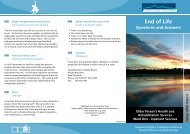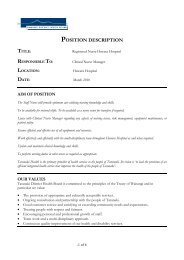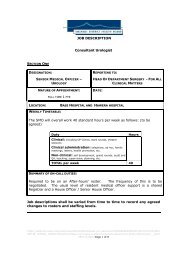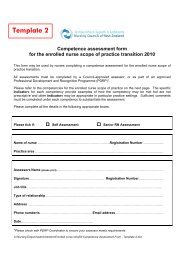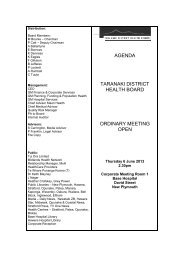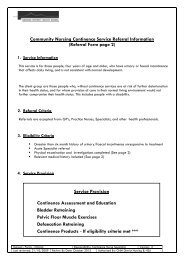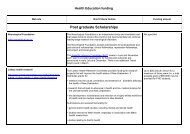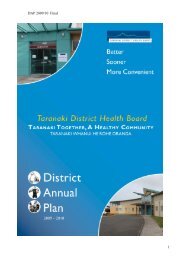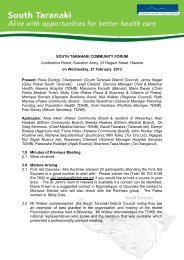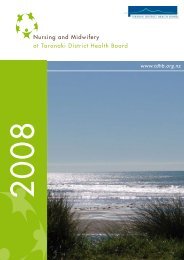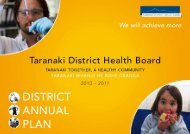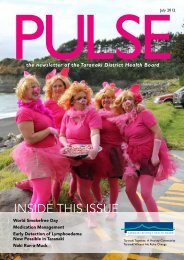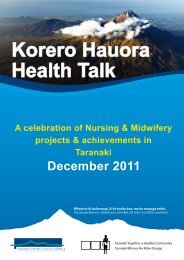This annual report - Taranaki District Health Board
This annual report - Taranaki District Health Board
This annual report - Taranaki District Health Board
- No tags were found...
Create successful ePaper yourself
Turn your PDF publications into a flip-book with our unique Google optimized e-Paper software.
Mental <strong>Health</strong> Commission. 2011. A literature review: Prevention and possibilities. A focus on children and youth.Wellington: Mental <strong>Health</strong> Commission. http://www.mhc.govt.nz/.<strong>This</strong> <strong>report</strong> sought to influence planners and funders in targeting funding at programmes aimed at achieving wellbeing forat risk children and young people, and reducing long-term mental health and addiction costs. The <strong>report</strong> included a briefliterature review on prevention in mental health in New Zealand and internationally, with a focus on cost-effectiveness.Findings included that there were financial benefits to prevention and early intervention; prevention initiatives wereunderdeveloped; and the determinants of mental distress, such unemployment, poor housing and poverty, should beconsidered in prevention activities. The Commission makes a number of recommendations for establishing a ‘preventionculture’ within <strong>District</strong> <strong>Health</strong> <strong>Board</strong>s including: maternal mental health and addiction services; developing expertise inprimary health to ensure early identification; ‘wraparound’ community-based services which strengthen whānau/familyresilience; and collaboration with other agencies to address the determinants of mental distress.Ministry of <strong>Health</strong>. 2010. Let’s get real: Implementation plan. Wellington: Ministry of <strong>Health</strong>.http://www.health.govt.nz/publication/lets-get-real-implementation-planMinistry of <strong>Health</strong>. 2008. Let’s get real: Real Skills for people working in mental health and addiction. Wellington:Ministry of <strong>Health</strong>. http://www.health.govt.nz/publication/lets-get-real-real-skills-people-working-mental-health-andaddictionThe Let’s Get Real framework and implementation plan describes the knowledge, skills and attitudes required by thoseworking in mental health and addiction treatment services. Let’s Get Real aims to strengthen shared understanding;affirm best practice; complement the HPCA Act 2003; improve transferability of knowledge, skills and attitudes; enhanceeffective workforce development; and increase accountability. The implementation roll out from 2009–2013 is describedand a variety of implementation resources are available at http://www.tepou.co.nz/supporting-workforce/lets-get-real.Office of the Prime Minister’s Science Advisory Committee. 2011. Improving the Transition: Reducing Social andPsychological Morbidity During Adolescence. A <strong>report</strong> from the Prime Minister’s Chief Science Advisor.Auckland: Office of the Prime Minister’s Science Advisory Committee. http://www.pmcsa.org.nz/.<strong>This</strong> <strong>report</strong> to the Prime Minister, by a multidisciplinary panel of experts, focused on how to improve outcomes for youngpeople in New Zealand in their transition from childhood to adulthood. It consists of a review of relevant peer-reviewedscientific literature on a range of topics, including transitions in the life course, life skills education and depression inyoung people, and a set of key recommendations. Recommendations include: a primary prevention or ‘life-course’approach to reducing the morbidity associated with adolescence, applied early in life; additional capacity in the mentalhealth work force, particularly those specifically trained to work with children and adolescents, to provide both screeningand treatment; and a strategic national approach to reducing depression in adolescence. The <strong>report</strong> found that althoughthe application of the evidence base to policy formation and programme development would lead to better outcomes foryoung people, many programmes that have been introduced are unlikely to succeed as they were not supported by theevidence-base. The authors identify the appropriate monitoring of effectiveness and cost effectiveness of all programmeswithin New Zealand, as a key challenge.Dowell A, et al. 2009. Evaluation of the Primary Mental <strong>Health</strong> Initiatives: Summary <strong>report</strong> 2008. Wellington:University of Otago and Ministry of <strong>Health</strong>. http://www.health.govt.nz/publication/evaluation-primary-mental-healthinitiatives-summary-<strong>report</strong><strong>This</strong> <strong>report</strong> describes the evaluation of the Ministry of <strong>Health</strong>-funded Primary Mental <strong>Health</strong> Initiatives (PMHIs). Theevaluation found that up to 80% of patients benefitted from the PMHIs. Improvement was sustained at six months ininitiatives that collected sufficient data. Although the evaluation found that mental health needs arising from mild tomoderate common mental health conditions, including those involving social complexity, could be addressed by primarycare, the needs of children and young people were not sufficiently met by the PMHIs, as over half did not offer servicesto this group.MEDSAFE. 2009. Selective serotonin re-uptake inhibitors (SSRI) in children and adolescents. Prescriber Update,30(1), 1.Royal Australian and New Zealand College of Psychiatrists. 2005. Clinical Guidance on the use of AntidepressantMedications in Children and Adolescents. http://www.ranzcp.org/Files/ranzcpattachments/Resources/College_Statements/Practice_Guidelines/Clinical_Guidance_on_the_use_of_Antidepressant_med.aspxBrief MEDSAFE guidance on the use of SSRI medication in children and adolescents was published in 2009 following areview of their use. The guidance highlights that all SSRIs have consistently been associated with an increase insuicidality in meta-analyses of clinical trials of the use of SSRIs to treat major depressive disorder (MDD) in children andadolescents, and that the only antidepressant with overall data indicating efficacy better than placebo in children andadolescents is fluoxetine. Informed consent must be obtained before initiating an SSRI for MDD in children oradolescents. All patients diagnosed with MDD should be monitored closely for suicidality, and antidepressant treatmentshould only be considered in consultation with specialist services. Particular care should be taken in the period shortlyafter initiating antidepressant treatment, after a change in dosage, and after discontinuing treatment. The RoyalAustralian and New Zealand College of Psychiatrists guidance provides a general summary of the use ofantidepressants in children and adolescents, which endorsed MEDSAFE advice.Access to Mental <strong>Health</strong> Services Introduction - 357



